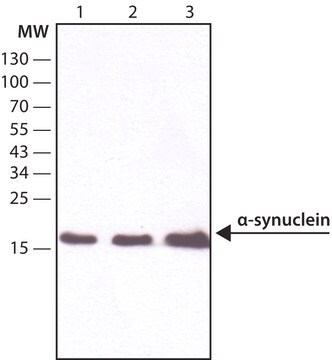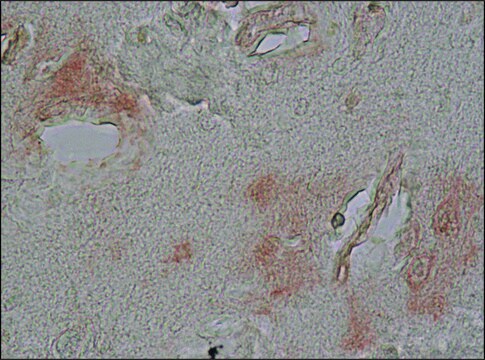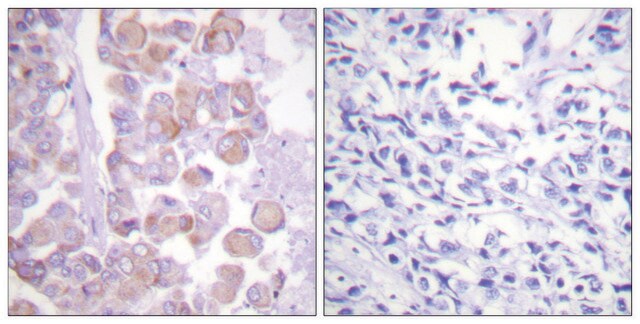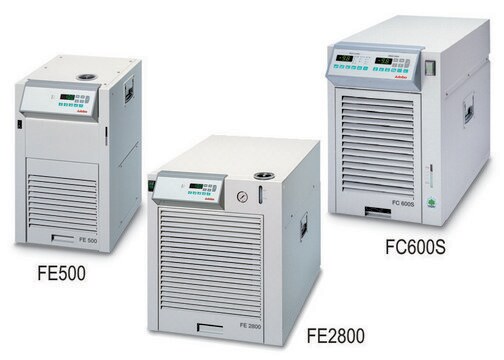ZMS1080
Anti-α-Synuclein Antibody, clone 2F12 ZooMAb® Mouse Monoclonal

recombinant, expressed in HEK 293 cells
Synonym(e):
Non-A beta component of AD amyloid
About This Item
Empfohlene Produkte
Biologische Quelle
mouse
Qualitätsniveau
Rekombinant
expressed in HEK 293 cells
Konjugat
unconjugated
Antikörperform
purified antibody
Antikörper-Produkttyp
primary antibodies
Klon
2F12, recombinant monoclonal
Produktlinie
ZooMAb® learn more
Form
lyophilized
Mol-Gew.
calculated mol wt 14.46 kDa
observed mol wt ~15 kDa
Aufgereinigt durch
using protein G
Speziesreaktivität
human, rat, mouse
Verpackung
antibody small pack of 25 μL
Grünere Alternativprodukt-Eigenschaften
Waste Prevention
Designing Safer Chemicals
Design for Energy Efficiency
Learn more about the Principles of Green Chemistry.
Erweiterte Validierung
recombinant expression
Learn more about Antibody Enhanced Validation
sustainability
Greener Alternative Product
Methode(n)
immunocytochemistry: suitable
immunohistochemistry (formalin-fixed, paraffin-embedded sections): suitable
immunoprecipitation (IP): suitable
western blot: suitable
Isotyp
IgG2bκ
Epitopsequenz
C-terminal
Protein-ID-Hinterlegungsnummer
UniProt-Hinterlegungsnummer
Grünere Alternativprodukt-Kategorie
Versandbedingung
ambient
Lagertemp.
2-8°C
Posttranslationale Modifikation Target
unmodified
Angaben zum Gen
human ... SCNA(6622)
Allgemeine Beschreibung
Each ZooMAb® antibody is manufactured using our proprietary recombinant expression system, purified to homogeneity, and precisely dispensed to produce robust and highly reproducible lot-to-lot consistency. Only top-performing clones are released for use by researchers. Each antibody is validated for high specificity and affinity across multiple applications, including its most commonly used application. ZooMAb® antibodies are reliably available and ready to ship when you need them.
Spezifität
Immunogen
Anwendung
Evaluated by Western Blotting in human thalamus tissue lysate.
Western Blotting Analysis: A 1:1,000 dilution of this antibody detected -Synuclein in human thalamus tissue lysate.
Tested applications
Western Blotting Analysis: A 1:1,000 dilution from a representative lot detected -Synuclein in human brain tissue lysate.
Immunohistochemistry (Paraffin) Analysis: A 1:1,000 dilution from a representative lot detected -Synuclein in human cerebral cortex and rat cerebellum tissue sections.
Immunoprecipitation Analysis: A representative lot of mouse monoclonal antibody (clone 2F12) immunoprecipitated -Synuclein in Immunoprecipitation applications (Courtesy of Tim Bartels, Ph.D., Brigham and Women′s Hospital, Boston, MA).
Immunocytochemistry Analysis: A 1:100 dilution from a representative lot detected -Synuclein in E18 mouse cortical cells.
Note: Actual optimal working dilutions must be determined by end user as specimens, and experimental conditions may vary with the end user
Zielbeschreibung
Physikalische Form
Rekonstituierung
Lagerung und Haltbarkeit
Rechtliche Hinweise
Haftungsausschluss
Not finding the right product?
Try our Produkt-Auswahlhilfe.
Lagerklassenschlüssel
13 - Non Combustible Solids
WGK
WGK 1
Analysenzertifikate (COA)
Suchen Sie nach Analysenzertifikate (COA), indem Sie die Lot-/Chargennummer des Produkts eingeben. Lot- und Chargennummern sind auf dem Produktetikett hinter den Wörtern ‘Lot’ oder ‘Batch’ (Lot oder Charge) zu finden.
Besitzen Sie dieses Produkt bereits?
In der Dokumentenbibliothek finden Sie die Dokumentation zu den Produkten, die Sie kürzlich erworben haben.
Unser Team von Wissenschaftlern verfügt über Erfahrung in allen Forschungsbereichen einschließlich Life Science, Materialwissenschaften, chemischer Synthese, Chromatographie, Analytik und vielen mehr..
Setzen Sie sich mit dem technischen Dienst in Verbindung.







